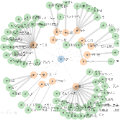A temporal knowledge graph (TKG) stores the events derived from the data involving time. Predicting events is extremely challenging due to the time-sensitive property of events. Besides, the previous TKG completion (TKGC) approaches cannot represent both the timeliness and the causality properties of events, simultaneously. To address these challenges, we propose a Logic and Commonsense-Guided Embedding model (LCGE) to jointly learn the time-sensitive representation involving timeliness and causality of events, together with the time-independent representation of events from the perspective of commonsense. Specifically, we design a temporal rule learning algorithm to construct a rule-guided predicate embedding regularization strategy for learning the causality among events. Furthermore, we could accurately evaluate the plausibility of events via auxiliary commonsense knowledge. The experimental results of TKGC task illustrate the significant performance improvements of our model compared with the existing approaches. More interestingly, our model is able to provide the explainability of the predicted results in the view of causal inference. The source code and datasets of this paper are available at https://github.com/ngl567/LCGE.
翻译:时间知识图(TKG)存储了时间数据产生的事件。预测事件由于事件的时间敏感性特性而极具挑战性。此外,先前的TKG完成方法不能同时代表事件的及时性和因果关系。为了应对这些挑战,我们提议了一个逻辑和常识指导嵌入模型(LCGE),以共同了解事件及时性和因果关系所涉的时间敏感代表性,以及从常识角度对事件进行时间独立的描述。具体地说,我们设计了一个时间规则学习算法,以构建一个规则引导的上游嵌入战略,以了解事件之间的因果关系。此外,我们可以通过辅助常识知识准确地评估事件的概率。TKGC任务的实验结果说明了与现有方法相比,我们模型的显著性能改进。更有意思的是,我们的模型能够从因果关系推论的角度解释预测的结果。本文的来源代码和数据集可在 https://github.com/ngl567/LCGEGE查阅 https://github.com/ngl567/LCGE。




